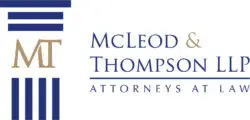Car accidents involving commercial vehicles, such as trucks, delivery vans or buses, often bring more severe consequences and a more complicated legal process than typical car accidents. In Pensacola, FL, these types of accidents can result in significant property damage, serious injuries and complex insurance claims. If you or a loved one has been involved in a commercial vehicle accident, it’s essential to understand how these cases differ from regular car accidents and why having an experienced legal team, like McLeod & Thompson, by your side is crucial.
1. Understanding Liability in Commercial Vehicle Accidents
Accidents involving commercial vehicles are often more complex when it comes to determining liability. Unlike regular car accidents, multiple parties could be responsible:
- The driver: If the driver was negligent (e.g., distracted driving, speeding or driving under the influence), they can be held responsible.
- The employer: If the driver was working at the time of the accident, the company may be liable under vicarious liability laws. Employers must ensure that their drivers are properly trained, their vehicles are in good working condition and they adhere to safety regulations.
- The vehicle manufacturer: In cases where faulty equipment (like brakes or tires) contributed to the accident, the vehicle manufacturer may be liable.
- Third parties: Other parties, such as maintenance companies or cargo loading companies, may also be held responsible, depending on the circumstances.
2. Regulations and Safety Standards for Commercial Vehicles
Commercial vehicles in Pensacola are subject to strict federal and state regulations that aim to prevent accidents:
- Hours of Service (HOS): Truck drivers are restricted in the number of hours they can drive each day to prevent fatigue. Violating these regulations can lead to accidents.
- Weight limits: Commercial trucks have weight limits to prevent accidents caused by overloading, which can make the truck harder to handle and increase the risk of accidents.
- Vehicle maintenance: Commercial vehicles are required to undergo regular maintenance and inspections. Failure to maintain the vehicle properly can result in accidents.
- Cargo loading: Improperly loaded cargo can cause accidents, especially when it shifts during transport or unbalances the vehicle.
3. Higher Insurance Limits in Commercial Vehicle Accidents
Commercial vehicles in Pensacola are required by law to carry much higher insurance coverage than passenger vehicles. Insurance limits for commercial vehicles typically range from $750,000 to $5 million. While this means higher potential compensation for accident victims, it also means that insurance companies representing large corporations often fight aggressively to reduce payouts. Having McLeod & Thompson on your side ensures that you can navigate these complex claims and maximize your settlement.
4. Investigating Commercial Vehicle Accidents
In the aftermath of a commercial vehicle accident, thorough investigation is crucial. Important factors to investigate include:
- Driver logs: To check whether the driver was following Hours of Service rules.
- Maintenance records: To assess whether the vehicle was properly maintained and if any mechanical issues contributed to the accident.
- Black box data: Many commercial vehicles are equipped with Event Data Recorders, also known as “black boxes,” that record valuable information about the vehicle’s speed, braking patterns and other relevant data at the time of the accident.
- Witnesses and surveillance footage: Gathering eyewitness accounts and reviewing nearby security camera footage can help strengthen your case.
5. Dealing with Multiple Insurance Policies
When a commercial vehicle is involved in an accident, there could be multiple insurance policies to contend with:
- The driver’s personal insurance.
- The employer’s commercial insurance.
- Other third-party insurers (e.g., vehicle manufacturers or maintenance companies).
This makes the claims process more complicated. McLeod & Thompson’s experienced attorneys can help you manage these various insurance claims and ensure you receive the compensation you deserve.
6. Seeking Fair Compensation
Commercial vehicle accidents often result in severe injuries, so the compensation can be much higher than in standard car accident cases. You may be entitled to:
- Medical expenses: This includes both current and future medical costs related to the accident.
- Lost wages: If you’re unable to work due to your injuries, you may be entitled to compensation for lost income.
- Pain and suffering: Compensation for the physical and emotional toll the accident has taken on you.
- Property damage: For repairing or replacing your vehicle and any other damaged property.
- Permanent disability: If you suffer a long-term disability as a result of the accident, you could receive compensation for ongoing care.
7. Statute of Limitations in Florida
In Florida, the statute of limitations for personal injury claims is typically two years from the date of the accident. For wrongful death claims, the statute of limitations is two years. It’s important to act quickly to ensure that your claim is filed within the appropriate time frame. McLeod & Thompson can help ensure that all necessary paperwork is filed on time, giving you the best chance at a successful claim.
8. Why Hire McLeod & Thompson?
Given the complexity of commercial vehicle accidents, hiring an experienced attorney is crucial. McLeod & Thompson in Pensacola, FL, has more than 40 years of experience handling cases involving commercial vehicles. Our skilled team will:
- Investigate the accident thoroughly.
- Handle all communication with insurance companies.
- Fight to ensure that all liable parties are held accountable.
- Help you get the compensation you deserve for medical bills, lost wages and more.
If you or a loved one has been injured in a commercial vehicle accident in Pensacola, don’t wait to get the help you need. Contact McLeod & Thompson today for a free consultation. Our team will guide you through every step of the process, ensuring you receive the fair compensation you deserve.
